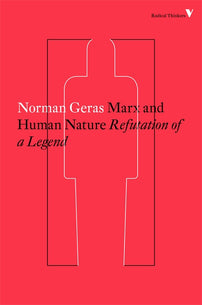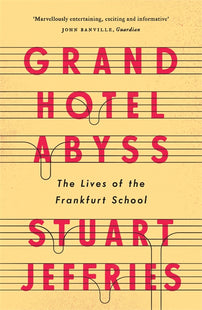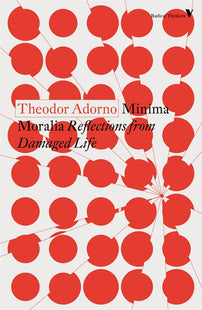Not Life, Just Stuff
On American Beauty, Herbert Marcuse and Erich Fromm, and what each can teach us about the nature of human needs under capitalism.

‘This isn’t life!’ the man cries. He spreads his arms, a bottle of beer in one hand, pointing to the things in an immaculately furnished living room. ‘This is just stuff. And it’s become more important to you than living. Well, honey, that’s just nuts.’
In Sam Mendes’s film American Beauty, Lester Burnham, played by Kevin Spacey, is a middle-aged magazine executive unhappily married to uptight real estate broker Carolyn (Annette Bening). Their sixteen-year-old daughter Jane loathes her parents and becomes involved with mysterious boy-next-door Ricky, who obsessively films what goes on around him with a camcorder, storing all the tapes in his bedroom, and uses part-time jobs as a waiter as a front for dealing cannabis. Ricky’s father Frank is a deeply homophobic retired US Marine colonel. Ricky’s mother, Barbara, stares into space, unresponsive.
Two events shake up Lester’s life, leading him to try to break through the limitations of his closed suburban world. First, Lester becomes infatuated with Jane’s vain cheerleader friend Angela Hayes after seeing her perform a half-time dance routine at a high school basketball game, and has erotic fantasies about her in which she appears to him in a swirl of red rose petals. Second, Lester witnesses Ricky bluntly quit a waiting job as they get high together during one of Carolyn’s work functions. Lester then spectacularly quits his own job and gets another in a local fast-food restaurant; starts smoking Ricky’s high-grade cannabis; works out in the garage; defies his wife, who he discovers having an affair with her business rival Buddy Kane; and buys his dream car. It all ends in tears.
American Beauty is hardly the only Hollywood film about consumerist suburban ennui. Its treatment of the subject – especially the characterisation of Lester and Carolyn and the way it shows the houses, cars, clothes that make up the object-world of advanced capitalism and the social and sexual attitudes that come with that – is, however, just damning enough to work as a starting point for critique. It chimes especially well with the thought of Erich Fromm and Herbert Marcuse. For both these thinkers, ideas around human needs is central, guiding their insights about the possibility of living a fulfilled and truly human form of life under advanced capitalism. Fromm and Marcuse’s writings thus offer us a way of explaining not only certain moments from American Beauty (Carolyn’s small-scale breakdown at the start of the film, Lester’s ‘this isn’t life!’ moment, two scenes at dinner, and Lester’s near-sexual encounter with Angela) but also the shortcomings of its vision of liberation from false needs.
Social psychologist Erich Fromm wants to explain how the economic base of a given society produces not only an ideological superstructure, but a psychological one. What he calls the ‘social character’ is the kind of personality common to most members of a class or society, formed by the interplay of economic, psychological, and ideological forces. Freud’s influence is clear, but Fromm takes a different approach. Whereas Freud analysed the psyches of individuals based on their traumatic early sexual experiences, Fromm’s main concern is the way human beings relate to the world, to nature, to others, and to themselves. Any society or class has its own psychological structure that the individual has to adapt to. But we are not simply crude ‘reflections’ of the society we live in. Rather, social expectations create the conditions for ideal, economically productive types of personality. By conforming with them, we develop traits that make us desire to act as we have to act to get along in our society so that behaving in this way becomes psychologically satisfying. We not only internalise social expectations, making them part of our unconscious strivings, but conform in such a way that living up to the social character becomes an inner compulsion.
American Beauty gives us Carolyn Burnham. She and Lester conform to the social character of the American professional middle class at the end of the twentieth century: wealthy compared to the rest of the world, but just ‘mass affluent’ by national standards; fiscally conservative but socially liberal; highly educated, so probably open to new ideas as long as they aren’t too dangerous; Carolyn is a family-focussed individualistic striver with a high degree of autonomy at work, yet still performs some of the typical duties of a homemaker of several decades earlier. She is always impeccably dressed and made up. Her hair is never out of place. She takes great pride in her job and her domestic skills: her home, car, cooking, and the roses in the Burnhams’ front garden. Freud would say her fastidiousness is typical of the ‘anal’ character. Because Fromm’s focus is not on the organisation of our libido but on how we relate to the world and ourselves, he provides us with a slightly different diagnosis. Carolyn has adapted her behaviour to what Fromm calls the ‘marketing orientation’, the dominant kind of character structure in the modern age.
‘In order to be successful,’ says Carolyn, ‘one must project an image of success at all times.’ This is typical of the marketing orientation, in which we produce and experience ourselves as commodities. We are both the sellers and the thing that gets sold, judging ourselves in terms of exchange-value. Material success depends on other people accepting a version of ourselves where we emphasise only what is most sellable about us – our cheerful disposition, our sound judgment, our aggressive sales pitch, our consistently meeting key performance indicators with a singular yet sprightly drive. The only thing that matters is that we are in demand, so the character we forge has no specific qualities that can’t be changed to meet new expectations or market requirements. Our self-esteem fluctuates accordingly. It always needs to be confirmed by others. ‘Success’ is thus the form of appearance of value, and any setbacks feel like severe threats, leading to infantile feelings of helplessness.
Take a scene early in the film when Carolyn attempts to sell a house. ‘I will sell this house today,’ she repeats like a breezy mantra as she sets up her stall, cleans the place, and reapplies her lipstick in the mirror. We see her try to sell the house to four different couples, smiling broadly while extolling the virtues of a ‘very dramatic’ living room, a fireplace, a kitchen that is ‘just filled with positive energy’, a ceiling fan, and a supposedly ‘lagoon-like’ swimming pool, all in a warm, even tone of voice. When nobody wants to buy the house, or her carefully cultivated personality, she begins to cry, admonishing herself, slapping herself in the face.
***
Fromm is interested in how and why mental life takes a certain shape. A different, if related, questions animates the thought of Herbert Marcuse. Fundamental for him is why people have failed to develop a revolutionary consciousness. Where Marx thought that capitalism’s inner contradictions would bring about its downfall, Marcuse describes advanced capitalism as a ‘one-dimensional’ society, a smoothly-functioning technological system that shapes everything we think and do, stifling even the slightest possibility of dissent. This is at least in part because of the new ideology brought about by the post-Second World War consumer boom. Marcuse thought the commodity form plays a far greater role in advanced capitalism than Marx could have possibly imagined. Consumerism has changed how we feel, what we value, and how we act. This binds us to the social order that has produced these new goods. Marx also described alienated labour as when the labourer is unable to realise their own essential human capabilities because they are separated from the product of their labour, from the act of labouring itself, from their essentially human ‘species being’ (which is to ‘confirm’ our basic humanity by producing things on our own terms and owning what we have produced), and from other human beings. Marcuse, however, saw alienation not in how people work, but how they see themselves in what they buy: ‘The people recognise themselves in their commodities,’ he says. ‘They find their soul in their automobile, hi-fi set, split-level home, kitchen equipment. The very mechanism which ties the individual to his society has changed, and social control is anchored in the new needs that it has produced’.
Take the scene we started with. Carolyn has just driven home after a rendezvous with Buddy Kane to find that Lester’s car isn’t in the drive – he’s traded it in for the car he has always wanted, a red 1970 Pontiac Firebird. When she enters the house, exasperated, ready to question her husband, Lester notices that she ‘looks great’, points out that they have the house to themselves, and makes a sexual advance. As he leans over her, and her eyes roll back anticipating ecstasy, he almost spills beer on the sofa. She abruptly stops. When Lester protests that it’s ‘just a couch’, Carolyn shouts that it is, in fact, a $4,000 sofa upholstered in Italian silk. Carolyn clearly ‘recognises herself’, as Marcuse puts it, not in her relationship with her husband, nor even in the secret joys she claims to have, but in the things she has bought. Her soul is not an inner resource that gives value to her life, but projected in an external object that embodies her taste, the hard work she put in to buy it, her status, her success, a faded image of what classical philosophers called ‘the good life’.
***
[book-strip index="1" style="display"]While the questions differ, their point of intersection between Fromm and Marcuse lies in their analysis of human needs. Fromm makes a three-way distinction between different kinds of needs: the physiological needs of the body, the inner needs of our personality, and our objective needs as human beings.
Our bodily needs include hunger, thirst, and sleep. These are the needs we must meet if we are to stay alive. That means we have to work. But the kind of work we have to do (hunting and gathering in early societies, office-work in our own) depends on the economic organisation of the society we live in. As we have seen, this also determines the kind of personality we need to develop.
This becomes important for the second type of need: to act in accordance with our basic character traits (for example, our capacity to love, our fearfulness, or our drive to succeed). This is a far more flexible kind of need than those of the body because it depends on how we adapt ourselves to the demands of the social character. These two needs go together, and it is impossible for the individual to change their dynamic: we have to live, so we have to work, but we can only work according to the social conditions that are already in place. There is a third kind of need, however. This is what Fromm calls ‘basic’ or ‘objective’ needs – the deep emotional and intellectual needs that stem directly from the contradictions of human existence.
Fromm lists five such needs: relatedness, transcendence, rootedness, identity, and the need for a frame of orientation and devotion. Each one comes with two poles representing ‘productive’ and ‘non-productive’ ways to satisfy them. The productive orientation is progressive. It leads to a true, mature kind of existence. The non-productive orientation is regressive, pathological, and is part of an attempt to return to the security of animal life that is always doomed to fail.
Relatedness refers to our need to form relationships with other people and the world outside us. Its two poles are love and narcissism. When we love – romantically or fraternally – we unite with something or someone beyond ourselves while allowing both them and us to remain separate beings. Narcissism, however, is a dangerous symbiotic kind of union that allows neither the self nor the other to exist on their own terms. The need for transcendence, meanwhile, is poised between creation and destruction. We can, on the one hand, creatively produce material things, art, and ideas. This takes us beyond mere animal life and give us a sense of purpose, freedom, and happiness. Or, on the other hand, we can actively try to destroy things, which leads to personal or collective suffering. The two poles of the need for rootedness are ‘brotherliness’, in which we feel at home in the world because we live with others, sharing help, warmth, and protection, and the ‘incestuous’ craving to return to one kind of ‘womb’ or another by submerging ourselves in the demands of the family, clan, nation, state, or church. To meet our need for a sense of identity, we can choose to be individuals, sensing ourselves as the subject of our own actions, or retreat to a kind of herd conformity where we unquestioningly identify our own thoughts and feelings with those of the crowd. Finally, the need for a frame of orientation and devotion manifests itself in either using reason to develop our ability to objectively grasp the world as it really is or irrationally seeing it only in terms of our own fears or desires.
Marcuse’s approach is quite different to Fromm’s. He sets up a distinction between ‘vital’ true needs and the ‘repressive’ false needs of the one-dimensional society, though he does not fully explain how and why true needs are really true and false needs really false.
True vital needs are the only ones Marcuse thinks have an ‘unqualified claim for satisfaction’. They include food, clothing, and a decent standard of housing. Meeting these needs is not merely the bare minimum necessary for survival, but the condition for the possibility of satisfying all our needs – our flourishing as individuals and social creatures, as well as that of other members of our society. This is only possible, however, under a completely different kind of social organisation, where the economy and administrative functions of society are all geared towards the satisfaction of those vital needs. Marcuse doesn’t specify exactly what kind of society would be able to do this, though he does say it would involve the rational and perhaps centralised control of the available intellectual and material resources. This is, he thinks, the condition for individual autonomy: a non-repressive civilisation made possible by the very technological means that currently oppress us.
One-dimensional false needs are imposed on us by the social order and bind us even more closely to it the more we meet them. Examples include money, possessions, and property. They are ‘false’ for two reasons. First, even when they are met, they are never truly satisfied. False needs have the power of, as Marcuse puts it, apparently ‘spontaneous reproduction’, even though we know that we have to work under repressive conditions to get the wages to buy the things that other people have toiled to produce. This, secondly, keeps the system running and prevents us from seeing it for what it really is. When we satisfy false needs, we are not only choosing things made up from options that have been decided for us in advance by other people, but perpetuating the alienation and misery of the system as a whole. What we then get is a merely ‘repressive satisfaction’ that integrates us into the technological system and maintains the conditions that keep it in place. In the process, all distinctions based on social class or race appear to be equalised because everybody can buy the same things as everyone else, and all opposition to the system is suffocated because there is no vantage point outside it from which to criticise it, allowing it to maintain stability.
Marcuse’s description of how we change this situation is paradoxical. To be liberated from false needs, we must become conscious of their falseness and discover for ourselves what our true needs really are. But how we do this is unclear. It can only be done under conditions where we are truly free from manipulation and indoctrination, which presupposes that the free distinction between true and false needs has already been made. No ‘tribunal’ can decide for us. That would just reproduce the structure of false needs. The question remains, however, how the conditions for freedom can be set out by people who have been so thoroughly dominated and manipulated. Marcuse’s answer is what he calls the ‘great refusal’. This is not the proletarian revolution of classical Marxism because the traditional working classes now identify with the advanced capitalist system. It is, rather, a total protest against the whole one-dimensional society led by those who have been left out of it – ‘outsiders’, racial and sexual minorities, students, and radical intellectuals.
Fromm’s physiological needs and Marcuse’s true vital needs are roughly the same thing. However, Fromm has no equivalent for Marcuse’s false needs, and Marcuse has none for Fromm’s objective needs. Nevertheless, the emphasis on freedom, spontaneity, and recovering a true sense of individuality is there throughout the work of both. We are now in a position to read American Beauty in terms of what Fromm and Marcuse mean by needs.
***
It is clear that Carolyn is trapped in a world of what Marcuse means by false needs. As we have seen, she doesn’t just take pride in her home, she sees herself in the things she has bought to fill it. Together with Lester, Carolyn provides for her family; the Burnhams don’t struggle to meet their true bodily needs, as we know many people do. We see this most clearly in two scenes set around the dinner table, the most obvious symbol for satisfying our physiological needs.
The first takes place before Lester decides to change things. The family eat their dinner in near-silence. Some syrupy light-jazz plays in the background. Jane complains about the music, and Carolyn replies sarcastically: ‘As soon as you’ve prepared a nutritious yet savoury meal I’m about to eat, you can listen to whatever you like.’ With those nutritious yet savoury meals eaten in a warm, comfortable house with running water, central heating, and all mod-cons, the Burnhams’ bodily needs are met. Though Lester clearly has no joy in his work and Carolyn is frustrated with hers, their way of life remains secure. Lester’s job is in jeopardy, but this causes irritation, not panic, like it might in another less affluent, less educated household. It doesn’t threaten to destabilise the home, family, or the ceaseless reproduction of the means to keep on meeting their bodily needs.
The second scene comes after Lester has quit his job. Carolyn mock-hysterically admonishes him. Newly emboldened, he complains to Jane that Carolyn ‘seems to prefer I go through life like a prisoner while she keeps my dick in a jar under the sink.’ Some of Lester’s physiological needs are clearly not being met. Nor is his need to be who he wants to be. And when neither Carolyn nor Jane pass the asparagus after he repeatedly asks for it, Lester stands up, gets it for himself, and throws the plate against the wall.
This is the first of Lester’s protests. The scene with the couch is the next Lester-Carolyn interaction we see. Here, however, he is not yet protesting against the tyranny of false needs, but against what it takes to meet his vital true needs: social conformity and the marketing orientation. What Lester’s rebellion really shows, however, is the empty politics of need at the heart of the film. The way Lester tries to change a life in which he is, as he says in the opening sequence, ‘dead already’, is so confused and contradictory that even when the film tries to distinguish between true and false needs, Lester shows himself up as anything but an agent of revolutionary social change. Even as he tries to break out of a world of what Fromm calls ‘automaton conformity’, he makes little to no attempt to meet his objective needs. He identifies something amiss in his life, but does not find the solution in, say, making art or building new relationships or rethinking his worldview. And even as he engages in a low-level version of Marcuse’s great refusal, all this really amounts to is buying new things his wife disapproves of – replacing one false need with another – while pursuing his lust for a teenage girl, which can hardly be said to trying to meet his objective need for love. Lester neither uses his reason to question the irrationality of the social order nor works towards a collective vision of happiness.
It is not even clear if Lester is truly thinking for himself. Fromm points out that having truly ‘original’ thoughts is not a matter of being the first person to ever think of something, but using our capacity for reason to find new values in the world or in ourselves. Lester is clearly rejecting the marketing orientation, but all his attempts to reclaim his own thoughts and wishes for himself (new car, new body, cannabis-smoking, Angela) ring hollow. It is unclear if this is really what he wants, or just something he feels he is supposed to want, just another false need. It never occurs to him to even think about the system of labour that condemns us to work boring or painful jobs to meet our vital bodily needs, let alone try and change it. Nor does he try to meet his objective need for transcendence, which would allow him to use all those parts of himself he had to deny or repress in his previous job. All he wants is to maximise his leisure time (one of the goals of radical social change, to be sure), but to achieve this he says, when he is interviewed for the job in the fast-food restaurant, that what he really wants is the least possible amount of responsibility. It goes to prove Marcuse’s point that advanced capitalist ideology runs so deeply that no genuinely oppositional forces can arise. Even when Lester thinks he is changing things, he is only trying to change things for himself. He is not cultivating new or different social goals or values, rejecting aggressiveness and guilt, or negating false needs; he is just retreating into another, alternate version of consumerism. His new frame for orientation and devotion is his own pleasure.
Nor, finally, is there anything redemptive in his fantasies about Angela. There is no true spontaneity in his thoughts or actions, no inkling that making good on his desires would fulfil his objective needs for love and productive work. His dreams – her flinging open her shirt during the dance-routine, on the ceiling of his bedroom, in a steaming bathtub asking to be washed in a sultry voice – aren’t crudely pornographic, but they do live up to a kind of typical male fantasy. If Lester were truly engaging in a ‘total’ protest against social conformity, which would include the way sexuality is used to sell us things, this kind of imagery should be beneath him. Lester’s conscience eventually prevents him from having sex with Angela when she reveals she is a virgin, contrary to all her earlier boasts. That doesn’t mean his personality is truly integrated, though. He never looks for what Fromm calls ‘interpersonal fusion’, which is the most powerful striving and fundamental passion human beings can have. He is, however briefly, condemned to feel what Marcuse calls ‘euphoria in unhappiness’.
Max L. Feldman is a writer based in Vienna.
[book-strip index="2" style="display"]


